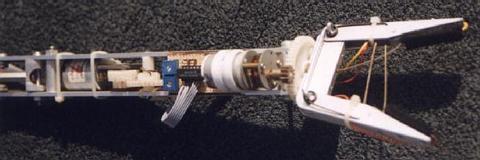I am using a linear actuator, that has an acme screw type of actuator. It will be used to apply up to 400 lbs of force to a gripper mechanism. I want to sense the force at the end of the actuator, which has a 3/8" dia rod-end type of connection, using a clevis pin. Ideally, it would have a 0-5v output for easy interfacing to an Arduino.
I have found clevis-pin type of strain sensors, but they seem to be very expensive. One was $900, and I need 3.
Current sensing is a cheap way to sense force for many gear systems, but since my actuqator does not back-drive, I don't think this is a viable solution for this type of actuator. Though, it might provide some level of information when the actuator is extending. At least I might be able to find when the gripper has started to grab.
Any suggestions for a more affordable sensor solution, than the $900 one I found?
-Joe
To make it clear about the
To make it clear about the type of load sensor I am looking for, here is a link to one. It is a little cheaper at $775, than the one I first found. But, still way more expensive than what I can use.
http://www.omega.com/pptst/LCP-SERIES.html
-Joe
Load Cells
Sparkfun carries a 200kg load cell for around $57US.
I was aware of these types
I was aware of these types of sensors, but the most straightforward way to sense the load in this design is to use a pin-type load sensor. The type you are suggesting would require significant re-design and machining to make the necessary connections.
I also obtained some quotes from other companies for the pin-type load cells. It seems that prices around $1,000 are the norm for this type of load sensor…
So, I think we will just need to settle for the current sensing when the force is applied. The items the gripper will grab can vary a bit in thickness. And that is why I was hoping to be more precise in determining how much force I am applying, since a simple blind movment of the gripper would not be sufficient. I will also add a simple switch to detect if the load has started to slide out of the gripper, and hopefully be able to tighten the grip a little bit more to stop it from sliding further.
Thanks for the reply, even if it did not meet our needs.
-Joe
Force sensor
When I built my robot arm & gripper some 20 years ago, I made my own force sensor by lining the gripper with conductive foam, (like IC’s ship in). I ran 2 parallel #30 wires the length of the foam and used these for the + and - input to a comparator, (LM324). A couple fixed resistors & a pot & you can scale the output to anything you want.



